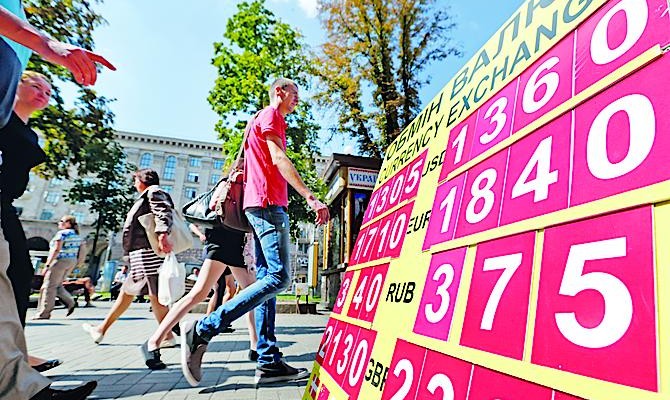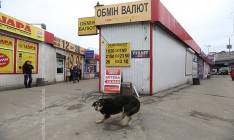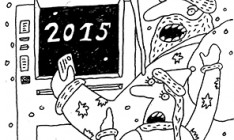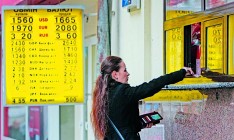Economy
State regulationThe National Bank of Ukraine decided to salvage the national currency by applying bans and limitations

The National Bank of Ukraine is trying to stop hryvnia collapse using the administrative methods that have recently become customary. As of September 2, the NBU banned the issuing of foreign currency by payment cards, introduced mandatory conversion of money transfers into hryvnia and slowed down the process of purchasing of foreign currency on the interbank currency exchange. All these measures will be in effect over the next three months. On the one hand, they are intended to reduce the demand for hard currency on the interbank exchange and, on the other hand, to increase supply.
As NBU Governor Valeriya Hontareva assured at a meeting with the managers of 40 of the largest banks of Ukraine last week, the new limitations should help bring the hryvnia back to the rate of UAH 12.50-13.00 per USD.
Barriers for individuals
As of this moment, hard currency proceeds in Ukraine can only be cashed in the national currency. This mainly applies to money transfers via international payment systems such as Western Union, Money Gramm and others. «Foreign currency transferred from abroad to a physical person (resident or non-resident) for the purpose of payment in cash without opening an account will be issued to the recipient only in hryvnia,» says the NBU’s document.
This measure is intended to reduce the needs of banks for hard currency to satisfy the demand of the population for cash in money transfers from abroad. This will mainly affect recipients of transfers from Ukrainians working abroad, Senior Analyst at the International Center for Policy Studies Oleksandr Zholud noted.
Though, he pointed out that they will not suffer from this as typically the recipients of money from workers abroad goes to support their relatives that do not have savings in hard currency and simply convert them into hryvnia to pay for their daily needs. Thanks to these measures banks can save US $4.1 bn of their hard currency liquidity. This was the amount of money transfers effectuated to Ukraine last year through international payment systems.
Besides that, residents and non-residents of Ukraine cannot withdraw money in foreign currency using their payment cards. Just as in the case of money transfers, this restriction will constrain the demand of banks for hard currency. This innovation will affect recipients of hard currency from relatives working abroad and foreign employers through corresponding accounts of banks. Last year a total of US $3.3 bn were transferred to Ukraine through this mechanism.
Besides the introduction of new limitations, the NBU extended to the end of this fall the effect of existing bans adopted in February on the issuing of foreign currency in cash from deposit and current accounts in the amount higher that UAH 15,000 per day.
At the same time, people will only have access to their hard currency deposits in hryvnia at the buy rate set by banks on the day of transaction. This measure is aimed at limiting the outflow of hard currency deposits, though in Zholud’s opinion in the mid-term future this will be an obstacle to banks in attracting depositors of hard currency. Zholud says this requirement helped hold back the outflow in the spring, but now statistics of this past summer indicate that there is no acute need for this.
The limitation on the purchase of hard currency in the amount of UAH 15,000 a day will be extended until March of next year. From the moment this measure was introduced it helped lower the purchase of hard currency from US $782.5 mn in February to clear sale of US $259.1 mn in April. In July people bought US $207.8 mn. In truth, experts are of the opinion that the decline in the demand for hard currency was not due to this norm, rather that the demand of the majority of Ukrainians was satisfied in February-March.
Brakes for banks
Simultaneously with holding back the demand for hard currency the National Bank of Ukraine is trying to regulate the demand of commercial banks and their corporate clients.
The resolution of the NBU obligated commercial banks to register funds in hryvnia on separate analytical accounts three days prior to the planned purchases of hard currency at the request of clients. «This should reduce the speculative operations in currency trading,» said Director of the Debt Instruments Department of Concorde Capital Yuriy Tovstenko.
The NBU has applied this measure since February and gradually eased its effect. The expert says the effect of postponement for three days or six days as it was in February will be the same. The demand of corporate clients of banks will be limited and the ban on premature repayment of loans of non-residents will be extended.
Earlier the NBU also took steps to increase the supply of foreign currency on the market. With this aim starting from September 2 it lowered the requirements to the banks as to their open hard currency position from 5% to 1%. This measure should in the short term allow for additional currency on the market.
Such radical measures of the NBU have already brought in their fruits of labor. On Monday the weighted rate of the hryvnia on the interbank exchange was fixed at UAH 13.12/USD, which on Friday was UAH 13.65/USD. However, at this point it is not clear for how long the NBU will manage to support the rate by applying such unpopular administrative methods.






 of the agreement of syndication with Financial Times Limited are strictly prohibited. Use of materials which refers to France-Presse, Reuters, Interfax-Ukraine, Ukrainian News, UNIAN agencies is strictly prohibited. Materials marked
of the agreement of syndication with Financial Times Limited are strictly prohibited. Use of materials which refers to France-Presse, Reuters, Interfax-Ukraine, Ukrainian News, UNIAN agencies is strictly prohibited. Materials marked  are published as advertisements.
are published as advertisements.